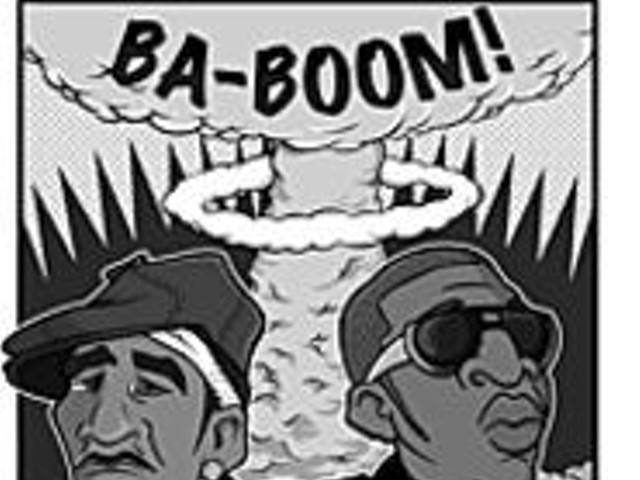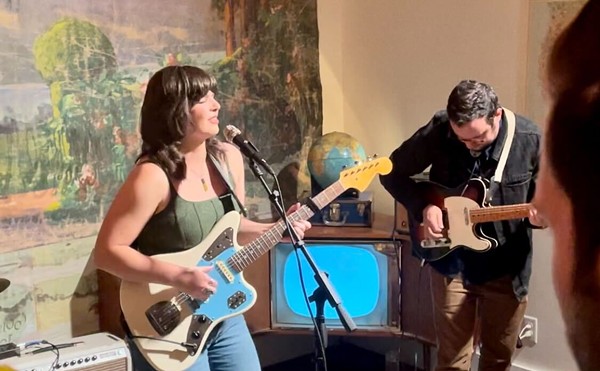Firmly in the crosshairs is Beenie Man, the veteran dancehall don who has enjoyed a long, fruitful career marked with international success and hit tunes including "Who Am I," "Wicked Slam," "Girls Dem Sugar" and "Dude." Beenie Man's current hit, "Damn," has caused consternation in England for lyrics like "Execute all the gays." The resulting anti-hate-speech backlash campaign, spearheaded by UK-based gay-rights organization OutRage!, has stopped Beenie Man's career momentum cold. His entire UK tour was scrapped, as was his planned appearance at MTV's recent VMA awards in Miami.
In early August, Beenie Man's record label, Virgin, issued an apology for his lyrics, but Beenie himself has yet to say he's sorry. In fact, he reiterated his homophobic stance during two August performances in Jamaica.
At this point, Beenie Man's twenty-year career is in jeopardy, and he may not be alone. In his zeal for justice, OutRage! spokesman Peter Tatchell went so far as to coin the term "reggae bigots" -- which seems oxymoronic, given that reggae has long been a genre that attacks racial inequity. In fact, referencing racism makes sense in this controversy -- but not in the way OutRage! intends.
To be sure, Jamaican artists make an easy target for gay activists. The homophobia in some cases is undeniable, even if it has to be translated for non-patois-speaking folks.
There's a lesson to be learned here from the censorship troubles faced by hip-hop a decade ago, when its mainstream appeal and economic clout were just starting to become apparent -- much as with dancehall today. Censoring "offensive" lyrics by Jamaican artists could result in the same kind of dumbing-down and mainstream filtration that saturated rap music following the Parents' Music Resource Center/Christian Coalition machinations of the '90s. As the controversy escalates, Beenie Man could easily become the Professor Griff (and Capleton the Ice-T) of his era, vilified through a well-orchestrated media campaign, while the real cause of the injustice goes unchecked.
At the very least, there's a danger in any predominantly white organization attempting to characterize a predominantly black culture according to its own agenda. OutRage!'s inflammatory press releases, for instance, detail instance after instance of lyrical "homophobic hate crimes" by Jamaican artists but fail to mention that most of the songs are several years old.
OutRage!'s strategy seems to be to force the Jamaican government into action by blockading what is in effect an export commodity. But why not go after the officials who have turned a blind eye to violence against gays and demand change on a legislative level? Instead, OutRage!'s campaign has dehumanized dancehall artists and, by forcing the cancellation of shows, has imposed de facto economic sanctions on an already poor nation tragically ravaged by violence -- only a small portion of which is directed at gays.
The same could be said of Beenie Man's lyrics. He's known more for advocating gay-bashing than anything else. Yet the artist has also decried black-on-black crime and police brutality ("Murderer") and praised oft-forgotten freedom fighters ("Steve Biko"). Likewise, Capleton is known for pro-peace songs ("Jah Jah City"), while Buju has recorded anti-gun tunes ("Mr. Nine") as well as nonsexist anthems ("Only Man"). Even Elephant Man has a political side -- he commented on 9/11 on the single "The Bombing," for instance. The point here is that all of these artists (not to mention Jamaican culture itself) are the product of a very complex set of factors, not the least of which is Jamaica's history as a processing center for African slaves and a colony under British rule, which may be the reason its denizens are overly sensitive about being emasculated.
Ask yourself: When does lyrical content become a hate crime, and when does it become a First Amendment issue? Where is the line, and who is drawing it? Interestingly, the protests against dancehall artists have all come from the white gay community, which, as some activists point out, isn't always so enlightened when it comes to racial issues. So in our zeal to identify and stamp out homophobia, are we overlooking racism? -- Erik K. Arnold
What's in This Kool-Aid?
If one were to believe the hype of the new documentary Dig!, Anton Alfred Newcombe, leader and creative force behind the constantly shifting lineup of rock collective the Brian Jonestown Massacre, disappeared into a drug netherworld, a bloated corpse brought low by instability and psychosis sometime in the '90s. The film, which covers the early career trajectory of the Dandy Warhols and the Massacre (bands that played in the same scene and were friends with one another), appears to chart the Warhols' rise to ostensible fame while the Massacre slips into darkness owing to Newcombe's erratic behavior. The popular consensus seems to be that he's no longer making worthwhile music. The funny thing is, no one told Newcombe that.
"It's tough when you read about yourself in a magazine or online," Newcombe says. "You can't really say, 'Wait a minute! There's more to that story.'[It] can be kind of hard, but I have had to deal with distraction and misperceptions my whole life. I plan to carry on making music."
Carry on he has. The most recent Massacre album, And This Is Our Music, is a stunning aural vista filled with everything from pop tunes and soundscapes to T. Rex-/Arthur Lee-style rave-ups and made quite a few critics' lists as one of the best albums of 2003. Not bad for a guy who is supposedly too chemical-addled and crazy to play.
This isn't to say that Newcombe hasn't been without his problems. Dedicated fans who have followed his career over its decade-plus span have witnessed everything from onstage meltdowns to mid-set band brawls to just plain stage desertion, with Newcombe's mood fueling the action. They've also seen some pretty amazing shows.
"I would like people to be able to separate the art from the artist, and just enjoy my work," Newcombe says. "The point is that I enjoy making music for the most part, and there are people who enjoy listening. It's never been easy for any real artist."
Pop culture needs people who, like Newcombe, exist on a fringe of the mainstream, driven more by a purity of heart and soul than a love of profit. "Some outlets feel my work is not important at all or not as important as some cunt that just won American Idol or something. I never set out to be a pop idol. I enjoy creating audio-immersion environments. That's what I do." -- Erik Alan Carlson
"Write" Stuff: A "Novel" Approach to "Rock" & Roll
The Rock Bottom Remainders: Wannapalooza Tour 2004
By Dave Barry/Amy Tan/Mitch Albom, et al.
Nocover version 26 October 2004,
$26.00, 0 Pages
By Julie Seabaugh, special to the RFT's Wednesday Book Review
Neo-modern-classic writer Barry/Tan/Albom's collected body of output has come to represent la crème de la crème of the humor/ethno-cultural/sports-afterlife-enlightenment-through-tarries-with-the-geriatric literary genre. Suffice to say that this most recent endeavor, a consummate travail destined to amass ministration for the charitable America Scores inner-city after-school programs, is not contradistinctive in the slightest.
Barry/Tan/Albom's enduring and beloved The Rock Bottom Remainders series is a post-ironic yet blithe perlustration on the nature of "rock stardom." Its main characters, grown surfeited of the proverbial cards dealt them by a life as chaotic as so many words cleaved from one's sanguine heart and violently spilt upon a blank page, have, since the days of the 1992 American Booksellers Association convention in Anaheim, sporadically forgone the scriber's existence for that of "musician."
The results are simultaneously jocose and vitalizing, deftly aggregating the whole of the human spirit through the paramount entertainment experience of reveling in a "cover band." The crux of the reverential confreres join with corroborative characters Frank McCourt, Scott Turow, Greg Iles, Kathi Kamen Goldmark, Roy Blount Jr. and St. Louis autochthon Ridley Pearson, and anthems such as "If the House is Rockin'," "Gloria," "I Will Survive," "Mustang Sally," "Rock Around the Clock" and "Wild Thing" flow forth from these bursting dams of musical talent like so many raging, boundless rivers. Yet in this particular exemplification, these very courses are not composed of water, silt and fish...but pulchritudinous music. Alas, no diminished sorrow is exuded to promulgate that insofar as the latest Wannapalooza Tour incarnation, neither the adored Matt Groening nor the ad-horrored Stephen King have broken free from the chains of obligation to manifest within the aggregate.
Remainders extols no mere symbols of caprice; the fully formed flesh-and-blood pluckers of guitars, blowers of saxophones and, in the case of the feminine leanings of Barry/Tan/Albom, wearers of sui generis couture, feature a perspicacious subplot in the form of Byrds' guitarist Roger McGuinn, who casts a striking shadow of lilting legitimacy. Verily, their difficile struggle is ours. The steadfast machinations of time shall tell, but Barry/Tan/Albom's most meritorious legacy shall perhaps be enjoining the collective conscious to embrace the Rock Bottom Remainders within, exculpatingly, ourselves.





